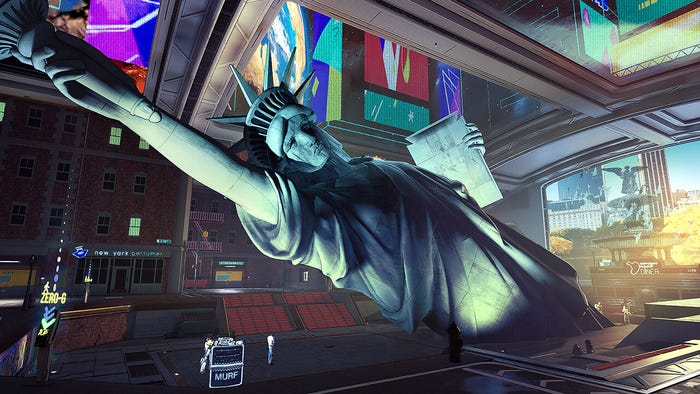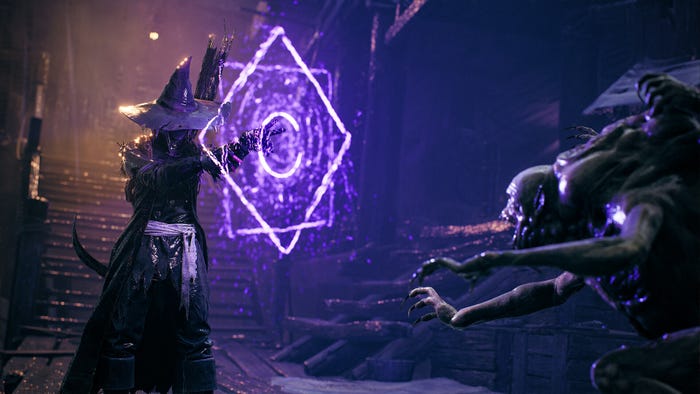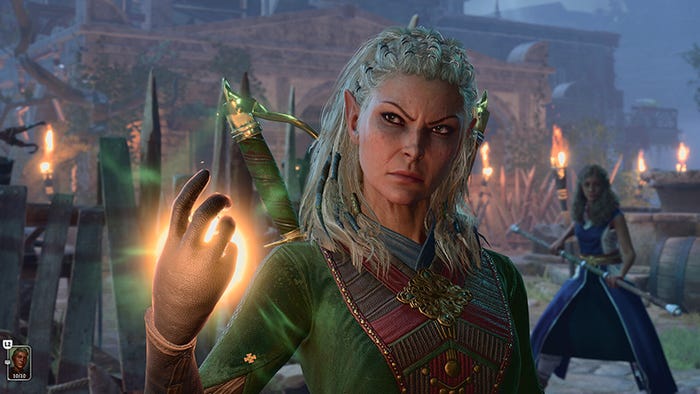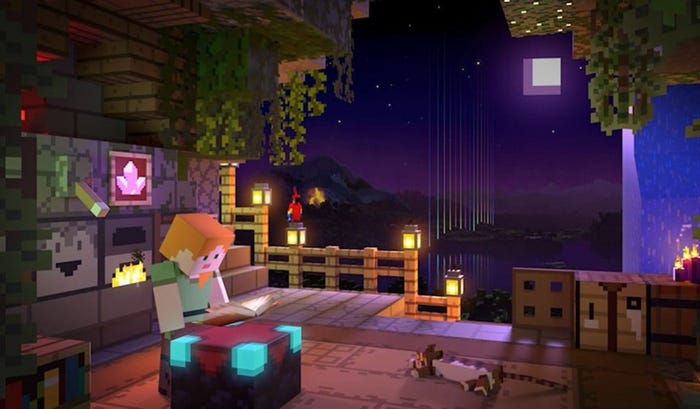Trending
Opinion: How will Project 2025 impact game developers?
The Heritage Foundation's manifesto for the possible next administration could do great harm to many, including large portions of the game development community.
It's been a bad year for game developers, and studios making live service games have taken some vicious body blows.

The ongoing saga of layoffs and studio closures in 2023 has been bad for developers of all shapes and sizes. But one notable surprise has been the dramatic impact they've had on companies behind live service games—and not just poor-performing ones, but successful ones like Fortnite and Destiny 2.
A slew of live service games have also been reportedly canceled or delayed by some of these developers. When you take a look at the whole picture, it paints a portrait of sudden declines for a business model that seemed foolproof for the last decade.
It would be wise for developers to not look upon these struggles as the "demise" of live service titles. Fortnite, League of Legends, and Counter-Strike 2 aren't going anywhere. The world of mobile games will still be dominated by free-to-play juggernauts like Call of Duty Mobile, and Clash of Clans.
But there is something in the air. Perhaps the largest signifier that something is amiss is PlayStation 5 developer Sony loudly announcing its intent to dive into the world of live service games, and now it's the one delaying troubled projects. Some live service games launched in 2023 have shut down within as little as two months.
The implications of a live service slowdown are not insignificant. Live service titles employ a large chunk of our industry, and can employ teams of developers from all skillsets. They drive massive profits for publishers and at some companies, they can be the financial bulwark that allows other teams to futz with experimental projects.
So what—beyond the general trends driving layoffs and closures this year—is plaguing this particular market?
We can't point to any one reason that live service games are having such a bad year, especially since some of the high-profile stories about the field center on games that haven't released yet.
We can however, identify several overlapping variables:
Ballooning development and user acquisition costs
User fatigue with monetization
Post COVID-19 revenue declines
A slowdown in "hot trends" like the battle royale boom
Mobile franchise expansions are not delivering expected returns
A number of news stories from the last year reflect these challenges. Sega and Creative Assembly's extraction shooter Hyenas was subject to a long development cycle plagued by creative indecision. Naughty Dog's multiplayer spinoff of The Last of Us has also been in development for an exceptionally long time, and its stalled progression has led Sony to "slow down" work on the project.
It's been less of a focus for Game Developer, but other sites have documented player frustration with how live service games are monetized. Perhaps the most high-profile instances of this was the negative feedback to Rocksteady's Suicide Squad: Kill the Justice League and Blizzard's decision to charge $15 for Overwatch 2 narrative content.
Player backlash to randomized loot boxes reached a fever pitch with the release of DICE's Star Wars Battlefront II, and in the years afterward developers followed Epic Games in augmenting such systems with Battle Pass or Season Pass systems. These monetization methods offered guaranteed rewards in exchange for an up-front payment.

Image via Creative Assembly
It seemed like a reasonable model, but the sense of FOMO built into it requires players in some games to check in on a daily basis if they want to make the most of their money. Tim Sweeney's comments describing declining Fortnite revenues may signal that this exhaustion has made its way to the shores of Epic Games.
We've also heard plenty about the decline of player spending in the years after COVID-19 pandemic lockdowns kept players inside.
Companies have been struggling to catch the wave of any supposed "hot trends" capturing player interest in multiplayer games. For a moment it seemed like "extraction shooters" like Escape from Tarkov would be the wave, but Activision Blizzard and Yager have run into struggles with the genre. Even Niantic seems to be a victim of its own success, as it can't find a successor to its still-massively successful Pokémon Go.
And lastly, companies like EA and Square Enix thought they would find riches in the land of mobile live service games built on existing brand names—but those efforts have come up short. EA cancelled Apex Legends Mobile and a Battlefield mobile game. Square Enix shut down a Dragon Quest title in early 2023, and Nintendo has declared that flagship mascot Mario won't be featured in any more mobile games.
This isn't to say sales of premium video games have proven to be any more stable—but if you were a developer thinking a live service game was a more reliable bet, you may want to look at these stories and carefully consider that thought.
Predicting the future is always a risky bet, and I personally stopped acting like I knew what the future would hold after Donald Trump was elected president of the states and the video game world lost its mind chasing the value of monkey jpgs.
But the game industry can't write off the value of recurring revenue, so I must at least predict we will not see a massive shift back to premium titles (though the success of Hi-Fi rush makes a compelling case for reasonably budgeted projects from larger companies...)
After thinking on the topic I am willing to make a few cautious guesses for 2024 and beyond:
It was newsletters from GameDiscoverCo founder Simon Carless that drew my eye to the steady power of DLC performance. Developers of games like A Little to the Left and Riftbreaker have done well by continuing to launch content after launch, and hit games like Dredge are also rolling out more content for players instead of immediately moving to the next game.
We don't even have to look that far in the world of higher-budget games to find successful DLC models. Techland's Dying Light 2 has received a steady stream of paid content drops since launch and Gunfire Games is doing some excellent experiments with letting players share access to DLC areas in Remnant II.

Image via Gunfire Games
Paradox of course is a leader in this field, with the multitudes of DLC available for titles Crusader Kings III and Stellaris—though it should be noted that players sometimes gripe over the costs of purchasing the most up-to-date version of the game.
Triple-A studios moved away from content-laden DLC packs in the early 2010s, but we may see a return to this model in the years ahead. DLC drops have a number of recurring benefits, even if they can't squeeze hundreds of dollars out of individual players. Each DLC becomes a marketing moment for a game that's already launched. That content can also draw revenue from players who check out a game in a free promotional weekend, or after the base game debuts on a subscription service like Xbox Game Pass. And of course, a strong post-launch pipeline can foster loyal players who become your game's greatest word-of-mouth advocates.
In the end, maybe developers should view a DLC pipeline as its own kind of live service model.
We can look to the following companies for indicators of how "early access" may make for strong blockbuster releases: Larian Studios, Supergiant Games, EA's Full Circle, and CD Projekt Red.
Larian Studios is the standout success in this category with Baldur's Gate 3, which completed a traditional journey through Steam Early Access and launched into 1.0 with a smashing, maybe unexpected amount of success. Single-player games have succeeded in Early Access before, but narrative-heavy games have faced the challenge of defining just how much story should be drip-fed to players with each update. Larian found the right balance for its Dungeons & Dragons-derived RPG, and will likely inspire others to follow.

Image via Larian Studios
CD Projekt has not officially released any Early Access titles, but one could argue that Cyberpunk 2077 accidentally became an Early Access game. After a calamitous launch in late 2020, developer CD Projekt Red would spend several years releasing quality-of-life updates that eventually culminated in a "2.0" update that has been praised for improving the quality of the original game. Its debut alongside the Phantom Liberty DLC also expanded the game's story and put a finishing cap on the base game's narrative.
EA has already committed to a form of early access with the open development of skate. We haven't heard a lot from developer Full Circle in a moment, but the game's marketing has gone so far as to make a public showing of the closed beta's many, many bugs. It's a charming and honest approach to what EA will eventually transition into a live service title.
And of course, we can't talk about early access without talking about Supergiant Games' Hades. The developer's first experiment with Early Access produced a massive hit and it's revealed that Hades II will make a similar journey through the format. It's not guaranteed to be as big of a hit this time, but Supergiant Games has one of the most high-quality libraries in game development. I'm sure they'll be fine.
I am ultimately very cynical about efforts to cash in on the success of Roblox and Minecraft by other developers. I am rooting for the studios being spun up to exclusively make titles inside of these platforms, but I am not excited about the future of "Islands" in Fortnite or other endeavors being spun up as we speak.
Let's address the elephant in the room: Roblox Corp. is still not turning a profit. It continues to enjoy exceptional popularity with younger players, but it's battling continued negative perception about player and developer safety. If you were to pitch me a game and say, "we want to do what Roblox does", I would at best say that train has already left the station. I would at worst say that I think Roblox's best days as an industry touchpoint are already past.
Tim Sweeney's comments on Fortnite revenue should also inspire cynicism with this model. He noted that revenue from games created in Unreal Engine for Fortnite are bringing the game back into profitability, but that revenue is also lower than Fortnite's live service revenue because of the fees owed to developers. Proponents of UGC platforms have gushed at the opportunity to take cuts of every sale between UGC creators—but it's possible revenue earned by said cuts may be oversold.
Of the biggest titles in the space, I do have to tip my hat to Minecraft for staying as popular as ever with this model. But it's Minecraft: the game is available on every platform and was purchased multiple times by players jumping from mobile to console to PC and back again. Mojang itself offers a bevy of DLC packs, and players are quite happy to mod the game for their own purposes if they aren't interested in what the creator market has to offer. I can't point to this model as one to follow.

Image via Mojang
I am also cynical about this model based on the type of games popular on these platforms. UGC platforms are home to "meme games," reconstructions of other popular games, and an ocean of copyright-infringing content. They are popular with younger players, but I don't believe players will have particular loyalty for any one developer and the games they make—their main focus is jumping into different goofy game modes with their friends.
Like the modding scene of yesteryear, there may be developers who become the biggest makers of popular game modes (think how the MOBA genre was born from Warcraft III mod Defense of the Ancients), but what's to stop said developers from striking out on their own? I have a suspicion that makers of popular UGC creations will have plenty of incentive to return to Steam, and companies like Roblox Corp. can't count on said players to only experience the game on their platform.
I want to be hopeful about smaller players in the space like ControlZee's dot big bang, but I fear investor interest in this genre is leading to overestimations of the long-term value. Ultimately, there is value in making games that drive players to experiment and be creative. But said value may be lost in pursuit of searching for that storefront cut.
It takes a certain level of detachment to call out the challenges live service games face in 2023. But it's important to remember those challenges come with a real cost: the loss of thousands of jobs. That's a lot of developers losing income, health insurance, and career prospects thanks to an overinvestment in recurring revenue by their employers.
I personally feel the foundation of the video game industry lies in the basic transaction of all entertainment: charging customers money for tickets. Customers want the opportunity to assess what they're buying and spend money up front to access it. Free-to-play live service titles allowed players to defer (or ignore) that cost, prioritizing revenue from the metaphorical food stands stationed inside the fair.
A big aspect of the post-COVID-19 revenue declines has to do with consumers exiting their homes and spending money out in the real world. They're going in droves to concerts, renaissance fairs, and turning movie releases like Barbie and Oppenheimer into cultural moments like Barbenheimer. I think it's reasonable for them to return home, boot up a video game, and ask why they're being charged over and over again for the same experience.
The downturn of live service titles is not something to celebrate. But developer innovation and the possibility of new recurring revenue models? That's always something to raise a glass to.
You May Also Like